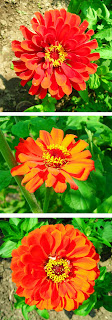The
earliest origins of the word harvest seem
obscure to me. In my estimation, the more logical argument is that the word
comes from words of long ago that meant to
pluck, as in plucking fruit. The
less obvious line of linguistic reasoning is that harvest is related to harrow,
a noun or a verb referring to the stirring of the soil prior to planting. My
thinking is that harrowing and harvesting are at such opposite ends of
the gardening venture that they must not be related. The word harrowing, though, can mean a
distressing experience that deeply stirs the emotions. Given the problems I
encountered with this year’s garden, I can certainly describe my gardening
experience as harrowing.
Plucking the fruits of my labor is much more
positive, and I want to focus on that meaning of harvesting. With more rain than anyone knew what to do with, my
garden lurched into productivity. It is only the beginning of July, yet almost
everything in my garden is ready to be harvested.
 |
| A Wagonload of Squash from My Garden |
I am
clipping vibrant flowers for bouquets. I must bring in my beets, prepare a few
for canning, and eat the rest. Yum! My carrots are at the delightfully tender
stage. Potatoes are nearing the day when they should be dug. Beans are setting
on, and I have a predictable surplus of squash, which I have been devouring
with gusto and a little salt. While the tomato plants are tall, bushy, and
green, they need hot days and dry air to be effective. I am already gathering
onions, and it will not be long before the entire crop should be dried on my
screened-in porch prior to tying the golden bulbs in bunches and hanging them
from nails on the walls of my solarium. (See my blog entitled “Why I Plant
Onions” [March 22].) I look forward to snipping off onions as needed in my
cooking.
So I feel
truly civilized. I have gardened. I have grown my own food. I am harvesting my
own vegetables. I am cultured, and I am literary. The word culture arises from an old word for plow (or plough, if you
prefer); as I have frequently plowed my garden, the earth and I (one of its
stewards) have become cultured. By virtue of the fact that literature arises
from culture and I have blogged about my garden, I hope I have been literary. I
have closed the circle: plowing, planting, weeding, hoeing, harvesting,
cooking, eating, reading, writing, culturing (plowing). In this way, agriculture can be seen as the
preparation for enlightenment, a higher circle, if you will. In the same way
that the blade of my hoe became polished during frequent use, the practice of
tending to my garden has polished me.
I come away
from the experience with respect for the cycles of nature and with joy for this
chance to breathe the air, work the ground, and pay attention to the songs of
warblers, the wings of butterflies, and the destinies of clouds. When I taste
the fresh beets, I feel at one with the planet hosting my little time here.
 |
| My Jubilant Zinnias |
Was my
garden worth the trouble? I have no doubt that the answer is yes. When I was in graduate school, I
came to value—to crave—the literary life: that is, bringing together literature
and my life. I felt that one of the greatest results to be gained from
diligently studying great works of literary art was to live a life of expanded
possibilities. My vegetables and flowers are filling my senses, and literature is
shaping my understanding and appreciation of what I am experiencing. This
summer, my garden is helping me confirm that literature amplifies existence.

No comments:
Post a Comment